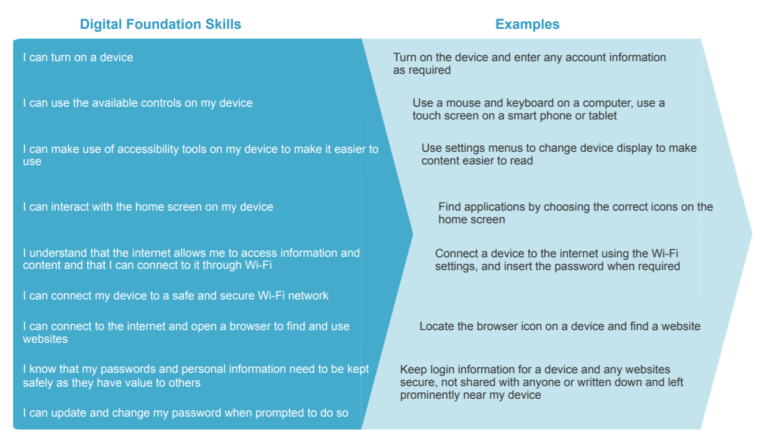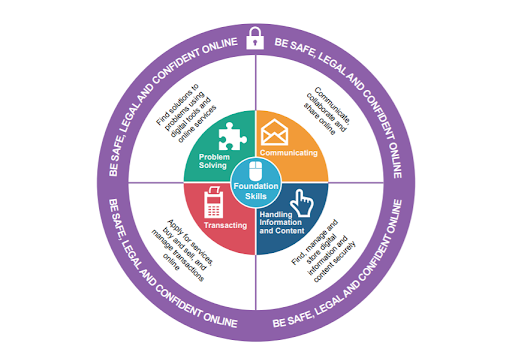Did you know that 96.5 per cent of the global population lives in an area covered by at least a 2G network? Given its importance on SDG, digital inclusion has been a top priority. With more than half of the world’s population online, a digital economy is on the rise. That is why digital skills are crucial for day to day activities and a successful career.
What are digital skills?
According to UNESCO, digital skills are a set of abilities that enable people to access and handle information. This can be done through digital technologies, communication apps, and networks. People with these skills can develop and exchange digital content, connect, work on projects, and so on. Digital skills also help you live a more efficient and prosperous life.
Did you know that 96% of households in the UK have internet access? In this digital era, functional digital skills are essential. Basic digital literacy is needed to use any digital devices or online services. Digital skills and these skills below can help us thrive in this connected economy and society as a whole.
- Solid literacy and numeracy skills
- Critical thinking and complex problem-solving
Why are digital skills important?
Digital skills underpin so much of how work is executed these days. For most professions, digital skills are simply essential skills these days. A study found that 93% of European workplaces use computers. They utilise 94% of broadband internet. And these are across all industries. The report also points out that even farmers require digital skills in the 21st century.
On the other hand, 38% of workplaces report that the lack of digital skills such as UI UX, AI,Digital Marketing, etc have negative impact on their performance. The need for digital skills is higher in professional careers. 90% of professionals must have at least basic digital skills, increasing to 98% of managers. In many workplaces, basic skills are not enough. 50% of professionals, technicians and 30% of managers must have specialist digital skills. This is particularly true in larger companies.
This need for digital skills is more likely to increase further as business shifts to the digital realm. According to Retail Economics stats, we’ll see over 50% of retail sales taking place online in the UK before the decade ends. ONS statistics says that internet sales already account for almost 20% of total sales.
A UN report estimates that the digital economy’s value varies from 4.5% to 15.5% of world GDP. Either way, that’s a significant sum. With a total value of $3 trillion, digitally deliverable service exports accounted for 50% of service exports. This is truly a global phenomenon.
The need for digital skills is more likely to continue to increase. This will be heightened by the fourth industrial revolution. We will see an incredible drive towards automation with two possible outcomes:
- The loss of jobs as they are automated
- Greater demand for those people with advanced digital skills.
In 2019, the World Economic Forum (WEF) estimated that 133 million new roles will be created by 2022. That’ll be because of the new division of labour between humans, machines, and algorithms. According to WEF estimates, the most in-demand skills will be:
- App and web-enabled markets
- Big data analytics
- The internet of things
Finally, we have to agree that the coronavirus pandemic has put a different spin on matters. Employees who relied on in-person interaction before are now forced to use digital technologies. So they need digital skills to carry out their day-to-day functions. Hopefully, the pandemic will not last forever. But remote working will likely be a deeply ingrained part of everyday working life.
What are basic digital skills?
According to a recent study on Digital Skills in the Workplace, 98% of workplaces require managers to have basic digital skills. And for professionals, technicians, clerical workers or agricultural workers, the percentage is 90.
The Department for Education (DfE) has provided a framework for essential digital skills. It gives us a guideline to enhance foundation skills. Also, it underpins all crucial digital skills. Digital foundation skills refer to the basics of using digital technologies. For example, using a browser, connecting to the internet, and keeping passwords secure. You can learn basic functional skills online, from your home computer, very easily.

The Essential Digital Skills Framework set out these five categories of essential digital skills for life and work:
1. Communicating.
2. Handling information and content.
3. Transacting.
4. Problem-solving.
5. Being safe and legal online.

These essential skills are described below –
Communicating:
Communicating involves interacting with others. Preferably using digital devices through emails and other messaging apps securely. It also consists of the following.
- Communicating appropriately by using email, online and collaborative digital tools
- Conforming with the organisation’s IT and social media policies.
- Complying with the organisation’s security protocols when accessing emails
- Using digital collaboration tools to meet with, share and collaborate with colleagues
- Using professional online networks and communities properly.
Handling information and content:
Handling information and content includes syncing and sharing information. You must be able to share them across different devices – computers, tablets and mobile phones. For example, you may have to search for information for work using browsers such as Chrome or Internet Explorer. Managing a calendar or appointments system on multiple devices, including a work computer and phone or tablet, are also basic digital skills.
Transacting:
Implications of transacting for work means the following:
- Completing digital records for absence, holidays or expenses online.
- Accessing salary and expenses information digitally, including password-protected payslips.
- Submitting requests for annual leave, recording absence from work
- Submit expenses claim online.
- Review own payslip and salary payments when received digitally.
Problem-solving:
Problem-solving for work means using the internet to find information. Information that helps solve work problems and does the following.
- Using appropriate software to present information to others.
- Using the right software. For example, creating a spreadsheet to manipulate and analyse data to help solve work problems.
- Understanding that different digital tools can improve productivity.
Being safe and legal online:
Being safe and legal online is an integral part of basic digital skills. Instances of this are given below.
- Knowing and using specific procedures to report suspicious emails to IT support staff in your organisation.
- Knowing that open source sites are available for content that can be used in the workplace and make use of them.
- Following specific organisational guidelines to allow backing up of content from work-based devices.
- Following organisational guidelines and policies for choosing login information. It includes choosing secure passwords and changing them when prompted.
These are basic digital skills needed in a day-to-day professional or personal context. For instance, a study shows 80% of workplaces require basic digital skills for sales workers. Basic digital skills are usually enough for working in traditional workplaces. More importantly, adopting digital systems help improve efficiency, security, and connectivity.
What are advanced digital skills?
Suppose you’re looking to work in the growing digital sector. In that case, you will need to possess more advanced skills specific to your business or industry. The following are some examples of advanced digital skills that can help you advance in your career.
Digital marketing
Digital marketing is a component of marketing. Here electronic devices and digital media platforms are used to promote products and services. The internet has radically changed the world of marketing. Now there is a level of precision and scale unseen in the pre-digital age. Specialised digital skills are needed to navigate this new terrain. There are many branches of digital marketing. That’s why expert practitioners often focus on one specific discipline. For example, pay-per-click advertising, search engine optimisation, email marketing etc.
The following courses can help enrich your skills and grow your career.
Social media marketing
Social media digital skills are vital to the digital marketing mix. Still, it is worth mentioning separately because of its significant role. With 2.7 billion active social media users worldwide, we can not deny its position in digital marketing. Some essential digital skills for social media are
- Social media management tools
- Performance measurement tools
- Brand presence
- Influencer marketing
- Analytical skills
Social media marketing goes beyond just posting a tweet or Facebook update. It’s about understanding the dynamic relationship with brands, influencers and consumers. Overall, businesses need to reach out to customers in ways that will drive traffic for potential conversion.
Social media has saturated our society well. And it has become the primary source of communication between content creators and consumers. For maximum community engagement, it is important to –
- Recognise social media influence
- Understand the intricacies of each platform
Search Engine Marketing
After social media, search engine marketing (SEM) is one of the most influential disciplines marketers have come to rely on. More than 6.5 billion Search Engine Marketing results are carried out each day. And Google accounts for almost 77% of that traffic.
Employees with SEM experience can increase the visibility of a company’s website on a search engine. By doing so, the businesses attract valuable web traffic from the search engine results page.
Most companies are in the business to sell products or services. And 81% of people search online for a product or service. Therefore, these products and services should be easily found online amongst their competition. That is why marketers, webmasters and content managers spend a lot of time optimising their websites and ad campaigns. SEO optimisation ensures the highest conversion rates possible.
User experience, or UX
Websites, apps and other digital services have one thing in common; a user interface. Any designer with experience creating effective, dynamic user experiences will be in high demand with most tech companies. Also, 79% of internet users admit to searching for another website if they can’t comfortably use one they landed on. So it is essential to invest in UX skill.

The experience of using a website or mobile app is vital to lead users to do what the website or app owner intends. UX is the art of making sure that apps, websites, and other digital channels are intuitive and enjoyable to use. For example, prototyping, wireframing, information architecture, visual communication skills are crucial for UX designers.
You can take these course to learn valuable user experience skills to grow your career.
Programming, Web and App Development
At the heart of every tech product or digital service is coding. The core languages that most programming, web and app development positions need to include are – Bootstrap, Angular, jQuery, Code Igniter, PHP/JavaScript and MySQL. Having a portfolio of projects illustrating your coding or programming skills can help validate your knowledge, expertise and help you land your dream job. For instance, mobile and responsive web development experience will give you an absolute edge over other job market candidates. Coding is also vital for rising technologies. For instance, augmented reality (AR) and virtual reality (VR).
Web Development is also growing even more in opportunities than ever before. Expanding fields such as IoT, AI, Data Sciences, and Cryptocurrency create an ever-increasing demand for specialist developers with a web background.
You can learn Python coding skills, Complete Full-Stack JavaScript, C++ Programming Online. You can earn a CPD accredited diploma to add to your resume and showcase your skills.
Digital Business Analysis
Digital business analysts are at the epicentre of digital transformation. Hence, digital business analysis skills are among the hottest skills to have on your resume. They also help organisations develop a digital ecosystem of technologies. That will help drive digital change and business growth.

Digital business analysis requires reviewing a great deal of information. For example, data about the web traffic that their online presence receives. They also research their industry to better understand what’s happening in the industry market. Digital business analysis helps companies make the right choices by providing useful analytics. For instance, you can apply a range of proven statistical analysis techniques to convince your supervisor to invest in a digital solution.
There are mainly four types of data analysis that are used by businesses.
- Descriptive analytics
This is often combined with other analytics. The descriptive analysis brings together primary or secondary data. The data are collected from multiple sources to provide valuable insights. - Diagnostic analytics
Diagnostic analytics requires more detailed data. It helps identify patterns and provide insights on specific problems. - Predictive analytics
Predictive analytics uses the findings of descriptive and diagnostic analytics. They help to detect tendencies, clusters and exceptions, and to predict future trends. - Prescriptive analytics
Prescriptive analytics require historical data and external information. It uses machine learning, business rules and algorithms to suggest what actions to take.
It is not just about analysis. You also have to visualise complex data to help management make vital business decisions. Data visualisation is extremely useful for leaders to gain valuable insights from data. Tools such as Tableau and Power BI are used by designers to analyse and visualise data.
Digital Project Management
Web project manager, web producer, digital marketing project manager, or digital producer are essentially digital project managers. A digital project manager is a person who oversees projects from inception all the way to the final phase. They need to have a holistic understanding of how digital projects are developed. They need to be aware of the whole process, from ideation and prototype to fully developed digital product or service.
So what is digital project management? It’s a process of managing online projects from concept to completion, within budget and using a certain amount of resources. It involves planning, delegating, tracking, reviewing, and measuring results. Usually, a project manager can do all these effectively, using project management software.

More remote teams need more project managers than ever need essential digital skills to succeed at their jobs. Building a new website to launching a mobile app, or planning a social campaign, all of them have one thing in common. That is, they all require a digital project manager. There’s a whole range of digital projects out there that could benefit from the watchful eye of a digital project manager.
Project management is by no means exclusively popular in tech companies. But it is an indispensable part of developing digital products and services within time and in a cost-effective manner.
Artificial intelligence
Artificial intelligence may still have a science fiction ring to it, but it’s real. Artificial intelligence is playing a dominant role in the modern business world. It’s not about the sentient robots of cinematic lore. Artificial intelligence is about teaching machines to do tasks, predict, and make decisions based on a detailed past data computation.
With business process automation playing a rising role in modern workplaces, think of automation to improve efficiency. Machine learning from big data to make better strategic decisions or predict how people will act in a given context is also vital. For instance, data visualisation, web and app development, CRM software, video production, and search engine marketing (SEM).
Content Marketing
Content takes many forms – blog posts, e-books, videos, podcasts, infographics and even social media status updates.

Marketers spend a lot of their time optimising keywords and advertising campaigns. But content is still king. Above all, a website or social media page is driven by its content. Without content marketing, customers have no way of understanding the benefits of a product or service.
Content is crucial in increasing brand awareness. And it can establish brands or influencers as thought leaders. Therefore, employees need to understand the importance of creating content and content relevant to keyword research and optimising them in a strategy. Some aspects of content marketing are given below –
- Content management systems (CMS)
- Content programming
- Content promotion
- Content strategy
- Content curation
- Image management
- Project management
You can take this Content Creation and Content Marketing course to follow the below mentioned paths:
- Content Creator
- Content Creation Manager
- Social Media Content Creator
- Public Relations Officer
- Copywriter
How big is the digital skills gap?
Despite the significance of digital skills, there is a huge skills gap. According to the Department for Education, with 10% of working adults not in possession of basic digital skills, the problems run deep in the UK. The Learning & Work Institute says that the number of young people taking IT subjects at GCSE has dropped 40% since 2015. So we can safely assume that digital skills at a higher level will be sorely lacking.

According to Deloitte, only 12% of executives believed that UK graduates had satisfactory digital skills in 2018, down from 20% in 2017. Three quarters reported that they experienced challenges in digital recruitment. This digital skills gap has repercussions not only for job seekers but the industry itself. This digital skills gap is even more pronounced in highly skilled professions.
Almost half of the European companies lack skills in the areas of artificial intelligence, cybersecurity, and robotics. There are opportunities for those sufficiently well-equipped and willing to develop such digital skills. As 89% of companies intend to invest in training to overcome these digital skills gaps.
BBC News shared four main reasons why the digital skills shortage is prevalent across the country:
- Lack of clearly defined job roles in specific fields
- Insufficient guidance and understanding about potential career paths
- Lack of relatable role models in such industries
- Difficulty in making technical professions seem appealing to young people, especially to young women
While the coronavirus pandemic has slowed down hiring, certain highly relevant positions are likely to be among the firsts to recover as organisations adjust to new ways of doing things. Digitally skilled employees will be well-placed to prosper.
How to learn digital skills to grow your career?
First, you need to find what digital skills to master. Think of your digital skills goal or your desired job and your skills gap. You will also need to have information on which jobs are growing in demand. You may choose from the digital skills mentioned below, or you may select one based on your skills gap.
- Automation
- Communication
- Marketing
- Analytics
- Design
- Development
Related:
1. Top Career Choices for PhD Graduates in the UK
2. How to Set SMART Goals to advance your Career

Some ways to improve your digital skills are given below:
1. Enrol in an online course
Here are many online courses that you can take to learn digital skills. Find the ones best suited for your needs. The following are some courses you may find helpful to learn digital skills:
- Functional skills
- Digital Designer
- UX (User Experience) Fundamentals
- User Experience Design from A-Z: Adobe XD UI/UX Design
- Python coding skills
- Digital marketing advanced skills
- Digital Marketing Masterclass – 12 Courses in 1
- SEO and Digital Media Marketing
- Telecommuting skills with g suite and google drive
- Essential IT skills
- Content Creation and Content Marketing
You can also search for a course by clicking here. If it is relevant to your career development, then it’s worth asking if your workplace will fund it.
2. Take formal classes
Formal classes are structured, and they have clear and specific objectives. If you are serious about learning a particular skill, taking a formal lesson might be worth it. You can sign up for a course at your local college or adult education service.
3. Utilise free resources
Suppose you are looking to brush up on your basic digital skills. In that case, there are many tutorials, and how-to guides are available online. While not all sources are trustworthy, you can still find great content. Especially if you do enough research with the intention to learn. Do enough research and find content creators who are sharing content relevant to your desired field. With self-management skills, you can benefit a lot from free content as well.
4. Find a mentor
A mentor is a skilled and experienced individual who can share his knowledge and expertise with you. Mentoring is an excellent way to speed up your learning process. It can also increase your chances of success by providing you with the necessary resources and suggestions. For example, you can ask someone digitally savvy in your office to help you learn.
5. Speak to an advisor
You can contact an advisor at the National Careers Service for helpful information and guidance. They can provide you with practical advice and guide you in the right direction.
Closing notes
The rapid growth of the internet and connectivity has paved the way for developing a digital economy across the world. This brings about the increasing need for digital skills in every sector. Eliminate your digital skills gap for a successful career in your industry.
FAQs
1. What are the 5 basic digital skills
Basic digital skills encompass computer literacy, online communication, internet navigation, digital security, and content creation.
2. Does digital marketing require coding?
No, digital marketing usually doesn’t need coding skills, but some basic knowledge can be helpful for specific tasks.
3. What are basic it skills?
Basic IT skills include operating computers, using software like word processors and spreadsheets, navigating the internet, and managing emails.








 April 17, 2023
April 17, 2023
















